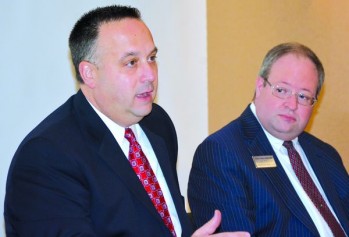
Wheeling Mayor Andy McKenzie, left, and Blair Taylor, executive director of the West Virginia Municipal Pension Oversight Board, participate in a discussion Monday during the Associated Press’ annual Legislative Lookahead in Charleston.
CHARLESTON, W.Va. — Even as West Virginia’s Municipal Home Rule Pilot Program expands from four cities to 20, Wheeling Mayor Andy McKenzie and Charleston Mayor Danny Jones want state lawmakers to continue handing more control over to local governments.
“Local government is the best government because they’re a part of the system. They’ve got a dog in the hunt,” McKenzie said Monday during the Associated Press’ annual Legislative Lookahead in Charleston.
Wheeling and Charleston were two of West Virginia’s original home rule cities, participating in the program since its inception in 2008.
During his 12 years as a state senator, McKenzie often found himself voting against policy changes that may have helped a community in another part of the state because it would have been detrimental to his district, or the state as a whole. Home rule, he said, began to change that – yet the Legislature continues to move cautiously when it comes to relinquishing authority to local governments.
If you ask Jones, it’s time to throw that caution to the wind.
“Give us blanket home rule,” he said.
West Virginia University economist John Deskins said his research largely supports McKenzie’s and Jones’ conclusions. West Virginia exercises a great deal of control over its cities compared with its neighbors, something he said could be holding back job creation in the state.
“Any notion that a one-size-fits-all economic development strategy (will be successful) is far-fetched, I think,” Deskins said. “Generally speaking, you don’t want to be an outlier. … West Virginia is an outlier in that regard.”
Critics of home rule argue the concept allows cities to tax residents almost at will – and 17 of the state’s 20 home rule cities indeed have levied, or plan to levy, a municipal sales tax under their increased authority under the pilot program. But McKenzie said home rule was never about taxes – it was about local control.
“When you have a problem, you need solutions, and sometimes that solution is money,” McKenzie said.
One problem faced by cities across the state which requires money – and lots of it – is pensions. Collectively, West Virginia cities carry about $1 billion in unfunded police and firefighter pension liabilities, and Charleston and Wheeling – at $280 million and $80 million, respectively – make up a substantial portion of that total.
A combination of factors, including longer life expectancy, inadequate funding by cities in the plans’ early years and a general lack of state oversight until relatively recently are to blame for the state’s pension woes, according to panelists.
“Who would have thought we’d be living into our 80s and 90s, 30 years ago? These plans were not initially projected to have people living as long as they are,” said Blair Taylor, executive director of the West Virginia Municipal Pensions Oversight Board.
In West Virginia, police officers and firefighters can retire at age 50 with 20 years of service. Although the physical demands of those jobs often translate to shorter careers, Jones said a system under which most retirees will draw benefits for many more years than they spent paying into the plan is unsustainable, and he hopes the Legislature will take that into consideration.
“I don’t want a war with the unions, but I want to raise it some,” Jones said of the police and fire retirement age.
Although McKenzie is grateful that home rule has given cities like Wheeling options to deal with pension liabilities, he said other problems, such as aging infrastructure, need attention, too.
“Every dollar that we’re putting into pensions … is a dollar less that we’re spending somewhere else to make our community better,” McKenzie said.
To read more from The Intelligencer/Wheeling News-Register, subscribe here.






